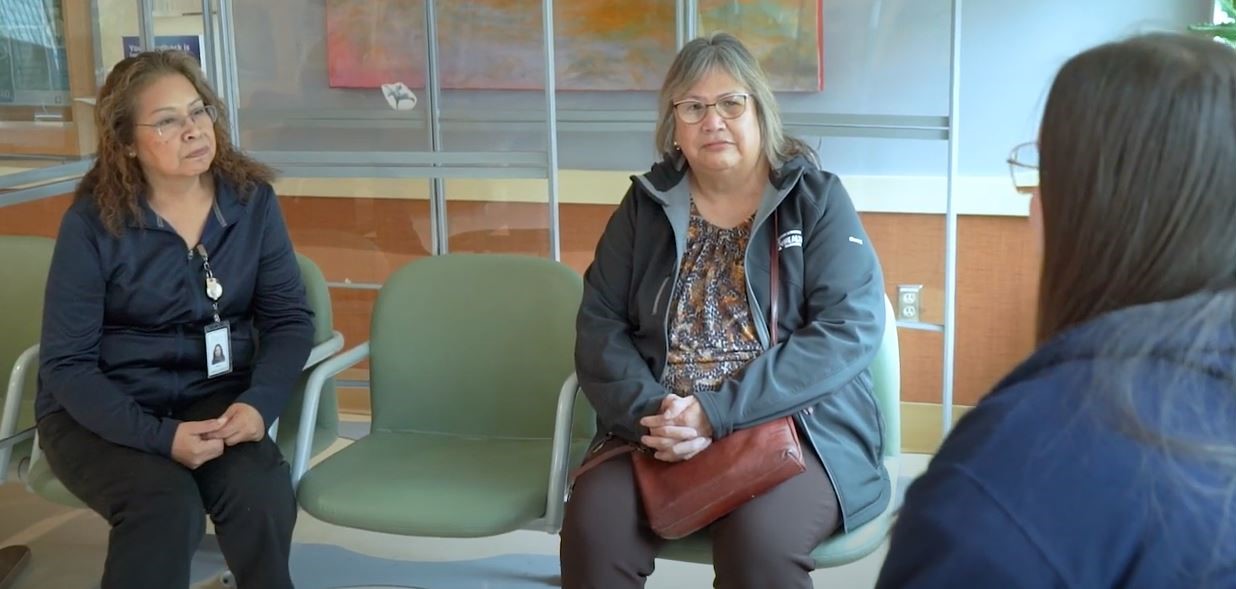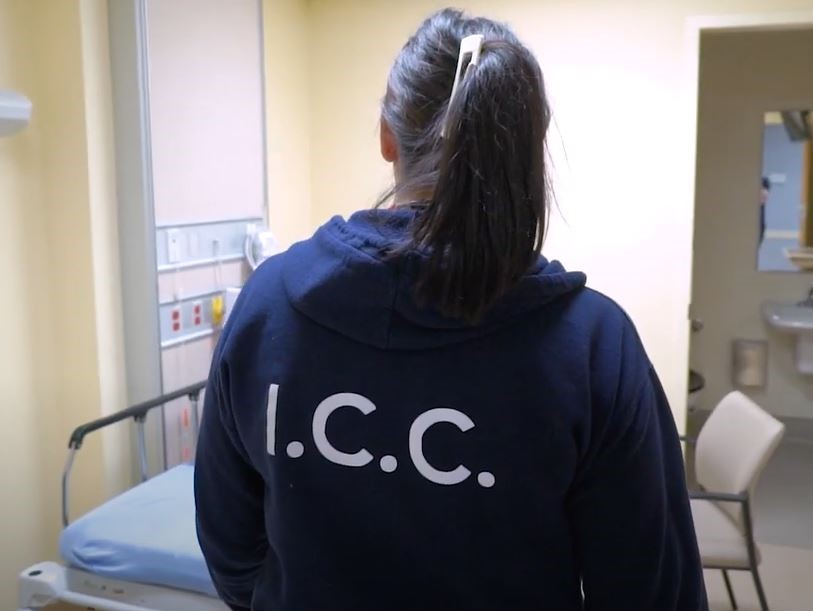(Back row, L to R): Dr. Miranda Lesperance - Vice President Indigenous Collaboration, Equity and Inclusion, Leona Kakepetum - Manager Indigenous Collaboration, Equity & Inclusion, Carla Shawayhamaish - Indigenous Care Coordinator (ICC), Naomi Sinclair - ICC. (Bottom row, L to R): Jillian Larabee - ICC, Martina White - ICC, Annette Klement - Cultural Safety Educator.
By: Gina Fata, Cultural Communications Specialist, Thunder Bay Regional Health Sciences Centre
Hospital environments can be particularly challenging and a lonely place for Indigenous Peoples, especially for those that have to travel long distances from their homes. Indigenous Peoples living in the remote and isolated Northwestern Ontario communities can often face many barriers in accessing quality health care. Thunder Bay Regional Health Sciences Centre (TBRHSC) recognizes the importance of providing equitable, culturally relevant, and sensitive care to Indigenous patients and their families. Whether an Indigenous patient resides in Thunder Bay or travels from their community within Northwestern Ontario, we continue to learn and understand their unique needs when providing care.
TBRHSC strives to create an environment of safety and belonging for all who walk through the door. To address the gaps in the health care system and improve outcomes for Indigenous patients, TBRHSC led the development of the Indigenous Care Coordinator (ICC) program. This program ensures a welcoming environment for patients and aimsto improve patient experiences and outcomes by respecting and incorporating Indigenous traditions and values and promoting a healing environment that is inclusive and supportive for Indigenous patients and families.
Launched in 2021, in partnership with Anishnawbe Mushkiki (which provides holistic health care including primary, traditional and alternative approaches for Indigenous patients) and Grand Council Treaty #3 (the governing body of the Anishinaabe Nation in Treaty #3), TBRHSC has five ICCs on site Monday to Friday from 8:00 a.m. to 11:00 p.m., to support culturally safe and quality care for Indigenous Peoples during their hospital stay.
 ICCs Carla Shawayhamaish (left) and Martina White (right) speak with a patient before admission.
ICCs Carla Shawayhamaish (left) and Martina White (right) speak with a patient before admission.
The ICCs are responsible for providing a range of health and mental health navigation, advocacy, and support services to Indigenous Peoples while an inpatient at TBRHSC. ICCs act as a point of contact within the patient's circle of care, ultimately improving their care experience.
Some of the most common services provided by the ICCs are interpretation services in Ojibwe and Oji-Cree, iPad lending for patients to reach their loved ones at home, participating in bed rounds to support patients, and helping staff navigate non-insured health benefit processes. As well, ICCs link patients to traditional care practitioners, spiritual care providers, or supporting traditional practices.
Additionally, the ICCs work with local, regional and federal supports to support patients requiring additional care. This is accomplished through discharge planning and leveraging community/regional-based services that are culturally appropriate. ICCs work with the discharge planner by processing community referrals to ensure necessary services are in place before discharge. This may include arranging assisted living or respite placement.
 Naomi Sinclair started her career in health care as a Registered Practical Nurse (RPN) and is now working as an ICC at TBRHSC.
Naomi Sinclair started her career in health care as a Registered Practical Nurse (RPN) and is now working as an ICC at TBRHSC.
"It was my compassionate heart and desire to help others that inspired me to pursue a career as an RPN," explained Naomi.
Naomi began working at TBRHSC in the Emergency Department (ED) then on the Adult Mental Health Team.
As an RPN, Naomi saw the need for culturally safe care of Indigenous patients and became an ICC.
"I find profound fulfillment navigating clients and their families through the health care system and ensuring they receive the culturally sensitive support they deserve," said Naomi.
From April 1, 2023 to March 31, 2024, ICCs had 5,334 patient visits. TBRHSC looks forward to welcoming more ICCs that will work in specific departments in the future.
An ICC entering the room of a patient wearing an ICC branded hoodie. This makes it easy for patients, family members and staff to identify the ICCs throughout Thunder Bay Regional Health Sciences Centre.
Patients can access ICC services through the self-identification process, the Hospital Health Team (social workers, physicians and nurses), by community or family requests, or by requesting one when they are admitted. They can also email TBRHSC.IndigenousCareCoordinators@tbh.net.
Together, we are working towards providing a culturally safe experience for all patients and staff and fostering understanding, community, and safety for all patients.